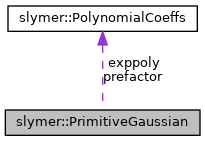A primitive Gaussian function. More...
#include <gaussian.h>

Public Member Functions | |
| PrimitiveGaussian () | |
Default constructor: Make the function 1 (   | |
| PrimitiveGaussian (const GaussianType &type, const std::array< double, 3 > ¢er, const double ec) | |
| Create a primitive Gaussian function centered on the specific point, with the specified decay constant and type. | |
| PrimitiveGaussian (const PolynomialCoeffs &exppoly_, const PolynomialCoeffs &prefactor_) | |
| Create a primitive Gaussian function with the specified exponential polynomial (quadratic) and polynomial prefactor. | |
| double | operator() (const std::array< double, 3 > &x) const |
| Evaluate the Gaussian primitive at the specified point. | |
| PrimitiveGaussian | operator* (const PrimitiveGaussian &rhs) const |
| Multiply two primitive Gaussians. The result is another. | |
Protected Types | |
| using | CF = std::tuple< PolynomialCoeffs, std::array< double, 3 >, std::array< double, 3 >, std::array< std::array< double, 3 >, 3 > > |
| Return type for the function's canonical form. | |
Protected Attributes | |
| PolynomialCoeffs | exppoly |
| Coefficients in the exponent's quadratic function. | |
| PolynomialCoeffs | prefactor |
Polynomial prefactor (  | |
Detailed Description
A primitive Gaussian function.
This basis function has the form
![\[
f(x,y,z) = p(x,y,z) \exp[(x-x_0)^T \Sigma (x-x_0)],
\]](form_262.png)
where 


This class is designed to work with Gaussian basis functions in quantum chemistry codes, but is made to be a bit more general for other applications.
The wikipedia page on multivariable normal distributions may be helpful (https://en.wikipedia.org/wiki/Multivariate_normal_distribution).
Member Typedef Documentation
◆ CF
|
protected |
Return type for the function's canonical form.
The first element is the polynomial prefactor, converted to use the principal coordinates. The second element is the array of decay values (eigenvalues of the covariance matrix). The third element is the 
Constructor & Destructor Documentation
◆ PrimitiveGaussian() [1/3]
|
inline |
Default constructor: Make the function 1 ( 

References prefactor.
◆ PrimitiveGaussian() [2/3]
| slymer::PrimitiveGaussian::PrimitiveGaussian | ( | const GaussianType & | type, |
| const std::array< double, 3 > & | center, | ||
| const double | ec | ||
| ) |
Create a primitive Gaussian function centered on the specific point, with the specified decay constant and type.
- Exceptions
-
std::invalid_argument if the decay constant is non-positive.
- Parameters
-
[in] type The orbital type of the Gaussian. [in] center The center of the Gaussian. [in] ec The decay constant in the exponential.
References slymer::dxx, slymer::dxxmyy, slymer::dxy, slymer::dxz, slymer::dyy, slymer::dyz, slymer::dzz, slymer::dzzmrr, exppoly, slymer::fxxx, slymer::fxxy, slymer::fxxymyyy, slymer::fxxz, slymer::fxxzmyyz, slymer::fxyy, slymer::fxyymxxx, slymer::fxyz, slymer::fxzz, slymer::fxzzmrrx, slymer::fyyy, slymer::fyyz, slymer::fyzz, slymer::fyzzmrry, slymer::fzzz, slymer::fzzzmrrz, slymer::gx2my2dz2mr2, slymer::gx4mx2y2py4, slymer::gxxxx, slymer::gxxxy, slymer::gxxxz, slymer::gxxyy, slymer::gxxyz, slymer::gxxzz, slymer::gxydx2my2, slymer::gxydz2mr2, slymer::gxyyy, slymer::gxyyz, slymer::gxyzz, slymer::gxzdx2my2, slymer::gxzdz2mr2, slymer::gxzzz, slymer::gyyyy, slymer::gyyyz, slymer::gyyzz, slymer::gyzdx2my2, slymer::gyzdz2mr2, slymer::gyzzz, slymer::gzero, slymer::gzzzz, slymer::hm1, slymer::hm2, slymer::hm3, slymer::hm4, slymer::hm5, slymer::hp1, slymer::hp2, slymer::hp3, slymer::hp4, slymer::hp5, slymer::hxxxxx, slymer::hxxxxy, slymer::hxxxxz, slymer::hxxxyy, slymer::hxxxyz, slymer::hxxxzz, slymer::hxxyyy, slymer::hxxyyz, slymer::hxxyzz, slymer::hxxzzz, slymer::hxyyyy, slymer::hxyyyz, slymer::hxyyzz, slymer::hxyzzz, slymer::hxzzzz, slymer::hyyyyy, slymer::hyyyyz, slymer::hyyyzz, slymer::hyyzzz, slymer::hyzzzz, slymer::hzero, slymer::hzzzzz, norm(), pi, pow(), prefactor, slymer::px, slymer::py, slymer::pz, and slymer::s.
◆ PrimitiveGaussian() [3/3]
| slymer::PrimitiveGaussian::PrimitiveGaussian | ( | const PolynomialCoeffs & | exppoly_, |
| const PolynomialCoeffs & | prefactor_ | ||
| ) |
Create a primitive Gaussian function with the specified exponential polynomial (quadratic) and polynomial prefactor.
- Exceptions
-
std::invalid_argument if the exponential polynomial is not quadratic (or constant or linear as subsets).
- Parameters
-
[in] exppoly_ The exponential polynomial. [in] prefactor_ The degree of the prefactor.
References exppoly, and slymer::PolynomialCoeffs::get_degree().
Member Function Documentation
◆ operator()()
| double slymer::PrimitiveGaussian::operator() | ( | const std::array< double, 3 > & | x | ) | const |
◆ operator*()
| PrimitiveGaussian slymer::PrimitiveGaussian::operator* | ( | const PrimitiveGaussian & | rhs | ) | const |
Member Data Documentation
◆ exppoly
|
protected |
Coefficients in the exponent's quadratic function.
Referenced by PrimitiveGaussian(), PrimitiveGaussian(), operator()(), and operator*().
◆ prefactor
|
protected |
Polynomial prefactor ( 
Referenced by PrimitiveGaussian(), PrimitiveGaussian(), operator()(), and operator*().
The documentation for this class was generated from the following files: